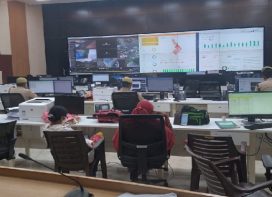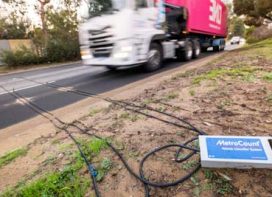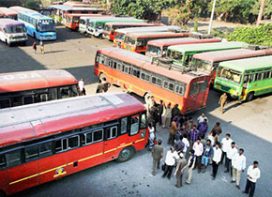Why, despite all the efforts, is sustainable transport not picking up in India?
One reason is integration in the various modes of transport. Until you look at it from the consumers? or users? point of view, you will never be able to achieve much. It is also important that people begin to understand what the best global practices are and try to emulate them instead of just saying that those practices will not work in India. A best practice is a best practice. All global best practices are entering India in manufacturing and services, so there is no reason why they should not come in public services. The politicians, the officials must appreciate these practices. Their challenges are cost. But then, there is the option of viability gap funding.
 Popular perception is that Gujarat used JnNURM funds brilliantly?
Popular perception is that Gujarat used JnNURM funds brilliantly?
But they also have a huge viability gap. There are two issues in viability gap. One is the capital cost and the other is the running cost. You cannot subsidise the running cost. There is a limitation to what the government can subsidise in terms of running cost. That must pay for itself. And running cost doesn?t mean your direct cost of paying the drivers, etc. The maintenance, the upkeep, the improvement ? everything has to come out of the ticket. One time capital subsidy can be paid to support system off the ground. That is ok and is a part of the government?s job. What are taxes for at the end of the day? They are to provide services, goods, etc., for public interest. Providing buses is one of the things that they can do which is what JnNURM is doing, but the type of buses they are getting is not up to the mark. So, then the question will be: why not import them from wherever they are available, which is what they are going to do. They are going to come out with a global tender for 10,000 buses apparently, pan India.
In Mumbai, they had gone in for King Long buses which were below par.
But it?s not that the buses are bad. They are working in China. People haven?t maintained them in Mumbai ? they didn?t buy the spare parts, they didn?t get the training. The point is that there is a huge industry that has to support public transport. Trains, monorails, etc., require industry support without a doubt in terms of manufacture, maintenance, improvements and all that. I think the government needs to realise that nobody minds paying a onetime fee for getting things off the ground but then the running cost of any public system must come out of tickets. It is not that people do not want to pay, it is just that they want a good return for it.
So you are positive about India?s sustainable transport?
I think the future for India is very strong on sustainable transport partly because there is a good realisation that there are limitations to the use of the car. Two wheelers and personal transport are so popular in India basically because their users are the very people who would have used public transport had it been available but because it is not available, they use, personal transport.
 One point in the WRI agenda is encouraging cycling!
One point in the WRI agenda is encouraging cycling!
Yes, yes very much. Walking and cycling are two important things as a personal mode, but they have to be done safely. You cannot expect people to cycle on our roads. You not only have to give them a cycle lane but you also have to make sure that only cycles move in the cycle rail. I am told in Delhi all the motorcycles move in the cycle lane. That is not the way to go about it. Non-motorised transport is very much part of sustainable transport. You have got to look at everything ? motorised, non motorised transport and the last mile. You have got to have buses on the cross traffic, the cycle rickshaw or motorised three wheeler as the last mile ? all these things are essential because finally, everybody has to move from their place of residence to their place of work and back.
One important thing India needs to do right away for sustainable transport?
The planners in every city must appreciate the role of public transport and what it can do to make their city more livable and more efficient.
Godrej has always been associated with environmental work. How do you do it? What makes you do it? How do you manage your time?
Our family has always been deeply involved in these issues. My uncle, SP Godrej, was very passionate about social and environmental issues. My wife, Pheroza, also is very interested in doing things. Everyone in the family is quite charged up about these things and giving back to society. We also see that when we can spend our own time and money on doing something and be consistent over a period of time to do it, we can get things done. It requires the ability to be able to spend time on doing something, bringing good people together to do it and also funding because I feel they both go hand in hand. I do fund the Embarq programme and WRI in India. You have to provide both. You have to help an organisation take off because most organisations flounder since they do not have good support ? you need financial support, managerial support, directional support, strategic support and you need a good bunch of people around you who also share similar thoughts and ideas and who are willing to do your type of work.
 TrafficInfraTech Magazine Linking People Places & Progress
TrafficInfraTech Magazine Linking People Places & Progress


